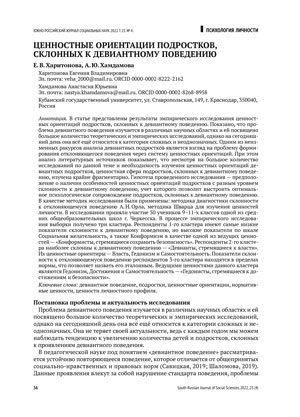Abstract
The paper presents the findings of an empirical analysis of value orientations of teenagers with a tendency toward deviant behavior. It is shown that the problem of deviant behavior is studied in various scientific areas and a large number of theoretical and experimental researches are devoted to it. Yet, it still belongs to complicated and controversial issues to date. One of the invariable aspects as regards the analysis of deviant teenagers is to view the problem of the formation of deviant behavior through the value orientations system. However, the analysis of literature resources indicates that notwithstanding a large number of surveys of teenagers with deviant behavior and the necessity to study their value orientations, the area of values among teenagers with a tendency toward deviant behavior was studied in an extremely fragmentary way. It was hypothesized that there are specific features of value orientations of teenagers with different levels of propensity toward deviant behavior, the consideration of which will allow build optimal psychological counseling for adolescents prone to deviant behavior. The following methods were used in the research: A. N. Orel’s method for diagnosing propensity toward deviant behavior, and S. H. Schwartz’s method for the study of personality values. 50 students from grades 9–11 from one of the secondary schools in the town of Cherkessk were involved in this research. In the course of the experimental research, three clusters were obtained. The respondents in Cluster 1 reported the lowest propensity for deviant behavior, but high values on the social desirability scale, while also having conformism as one of the top values. They are “Conformists striving to maintain safety”. The respondents in Cluster 2 are most prone to deviant behavior. They are “Power-seeking deviants”. They have Power, Hedonism, and Independence as their values. The indicators of the propensity for deviant behavior of the respondents in Cluster 3 are well within the normal range, thus allowing us to call it a standard cluster. The guiding values of this Cluster are Hedonism and Achievement and Independence. The respondents are “Hedonists striving for Achievement and Security”.
Keywords
References
Воробьева, К.А. (2021). Социально-психологические проблемы подростков «группы риска» и пути их разрешения в реальном и виртуальном пространстве. Актуальные проблемы психологического знания, 3(56), 69–78. DOI: 10.51944/2073–8544_2021_3_69
Громова, И.А., Олифирович, Н.И. (2018). Особенности родительской семьи у зависимых от психоактивных веществ. Южно-российский журнал социальных наук, 19(2), 132–141.
Дюркгейм, Э., Мертон, Р. (2013) Теория аномии. Москва: Просвещение.
Зиновьева, Л.В. (2019). Структура ролевых диспозиций подростков, склонных к девиантному поведению (Кандидатская диссертация). Ярославль.
Змановская, Е.В. (2008). Девиантология (Психология отклоняющегося поведения). Москва: Академия.
Карандашев, В.Н. (2004). Методика Шварца для изучения ценностей личности: концепция и методическое руководство. Санкт-Петербург: Речь.
Клейберг, Ю.А. (2022). Психология девиантного поведения: учебник и практикум для вузов. Москва: Издательство Юрайт.
Короленко, Ц.П., Донских, Т.А. (1990). Семь путей к катастрофе: деструктивное поведение в современном мире. Новосибирск: Наука.
Кошман, Н.В. (2017). Профилактика девиантного поведения подростков и молодежи в процессе организации социального воспитания в учреждении дополнительного образования. Вестник педагогических инноваций, 3(47), 32–39.
Мандрыгина, Е.А. (2020). Исследование особенностей смысложизненных ориентаций у подростков с девиантным поведением. Психология и педагогика служебной деятельности, 3, 109–111. DOI: 10.24411/2658-638Х‑2020-10085
Николаенко, Я.Н., Сабирзянова, А.Ф. (2014). Структура ценностных ориентаций подростков с девиантным и делинквентным поведением. Научное мнение, 9, 103–109.
Ощепков, А.А. (2012). Особенности ценностных ориентаций и социальных установок подростков, склонных к девиантному поведению (Кандидатская диссертация). Казань.
Савин, А.А. (2020). К проблеме девиантного поведения несовершеннолетних преступников. Modern Science, 12(1). 336–339.
Савицкая, Н.В. (2019). Основные направления социально-педагогической профилактики девиантного поведения детей и подростков. Социальные отношения, 2(29). 83–90.
Свинцицкая, Т.А. Профилактика девиантного поведения подростков в социальной работе. Молодой ученый, 11(91). 1224–1226.
Слюсарев, Ю.В. (1992). Психологическое сопровождение как фактор активизации саморазвития личности (Кандидатская диссертация). Санкт-Петербург.
Смирнова, Р.В., Палаткина, Г.В., Тарасова, И.В., Подлипалин, А.А. (2020). Сущностные характеристики девиантных субкультур подростков: социально-культурные, социально-экономические, социально-педагогические, социально-психологические. Мир науки. Педагогика и психология, 6. Режим доступа https://mir-nauki.com/PDF/120PDMN620.pdf
Федотова, В.А. (2017). Ценности россиян в контексте возрастных различий. Вестник Пермского университета. Философия. Психология. Социология, 1. 78–86. DOI: 10.17072/2078-7898/2017-1-78-86.
Фетисова, Т.А., Клепач, Ю.В. (2017). Формирование ценностных ориентаций у подростков «группы риска». В О некоторых вопросах и проблемах психологии и педагогики: сборник научных трудов по итогам международной научно-практической конференции (с. 95–97). Красноярск: Инновационный центр развития образования и науки.
Харитонова, Е.В., Суслина, Е.В. (2020). Личностные особенности склонности подростков к деструктивным видам активности. Южно-российский журнал социальных наук, 21(3), 97–111. DOI: 10.31429/26190567-21-3-97-111
Шаломова, Е.В. (2019). Развитие духовно-нравственных ценностей подростков как фактор профилактики их аддиктивного поведения. Вестник Владимирского государственного университета им. Александра Григорьевича и Николая Григорьевича Столетовых, 38(57). 137–143.
Чепелева, Л.М., Дружинина, Э.Л. (2016). Влияние информационных технологий и кибермоббинга на суиицидальные тенденции в подростковой среде. Человек. Сообщество. Управление, 17(2), 55–69.
Garfield, E. (1987). The Anomie-Deviant Behavior Connection: The Theories of Durkheim, Merton, and Srole. Essays of an Information Scientist, 10(39), 272–281.
Schwartz, S.H. (1994). Are there universal aspects in the structure and contents of human values? Journal of Social Issues, 50(4), 19–45. DOI: 10.1111/j.1540-4560.1994.tb01196.x


